Hexagramme 51 du Yi Jing - Trait 3
L'hexagramme : 51
Un hexagramme est une combinaison de six traits yin et yang.
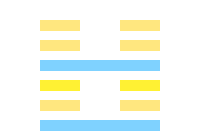
51.3 (51 > 55) - THE KĂN HEXAGRAM.
The third line, divided, shows its subject distraught amid the startling movements going on. If those movements excite him to (right) action, there will be no mistake.
Bing DeepL Google Yandex51.3 (51 > 55) - Kán, l’ébranlement
Kán : tonnerre, effroi répandu, crainte.
Le tonnerre émeut, agite ; il pousse à agir justement.
Bing DeepL Google YandexLes trigrammes
Les trigrammes sont des combinaisons de trois traits yin et yang. Dans l'hexagramme, les trois traits du dessous constituent le trigramme inférieur et représentent la situation intérieure. Les trois lignes du haut constituent le trigramme supérieur et représentent la situation extérieure.
trigSup

Trigramme inférieur : Le tonnerre Le feu


L'hexagramme nucléaire : 39.2.4 (39 > 28)
L'hexagramme nucléaire est l'association des deux trigrammes intérieurs (traits 2,3,4 et 3,4,5). Il représente la racine, ou l'origine de la situation.

39.2.4 (39 > 28) - THE KIEN HEXAGRAM.
- 2. The second line, divided, shows the minister of the king struggling with difficulty on difficulty, and not with a view to his own advantage.
- 4. The fourth line, divided, shows its subject advancing, (but only) to (greater) difficulties. He remains stationary, and unites (with the subject of the line above).
39.2.4 (39 > 28) - Spending one's days making efforts
One works hard to receive a meager livelihood.
Bing DeepL Google Yandex39.2.4 (39 > 28) - Spending one's days making efforts
One works hard to receive a meager livelihood.
Bing DeepL Google Yandex39.2.4 (39 > 28) - Kién, l’obstacle
Kién : Difficulté, danger, noble hardiesse.
- 2. Si le prince et ses ministres ont difficultés sur difficultés, ce n’est point (nécessairement) parce qu’ils recherchent leur propre avantage (ou : cela ne dépend pas nécessairement d’eux-mêmes).
-
4. Un autre y va et revient uni à ceux qui les ont partagées.
Il faut être fidèle dans ses fonctions.
39.2.4 (39 > 28) - Passer ses journées à faire des efforts
On trime pour recevoir une maigre subsistance.
Bing DeepL Google Yandex39.2.4 (39 > 28) - Bizonytalanság
- 2. Sok nehézség mások táplálásában.
- 4. A többiek nincsenek ott így várnia kell rájuk.
Le dérivé (Fan Yao) : 55.3
Le même trait sur l'hexagramme après la mutation. Il représente ce qui peut être fait APRÈS pour corriger la situation décrite par ce trait, un peu comme un remède ou une solution.

55.3 (55 > 51) - THE FĂNG HEXAGRAM.
The third line, undivided, shows its subject with an (additional) screen of a large and thick banner, through which at midday he can see (the small) Mei star. (In the darkness) he breaks his right arm ; but there will be no error.
Bing DeepL Google Yandex55.3 (55 > 51) - Yielding to pressure
The weakest abstain because they don't want to bear any more.
Bing DeepL Google Yandex55.3 (55 > 51) - Yielding to pressure
The weakest abstain because they don't want to bear any more.
Bing DeepL Google Yandex55.3 (55 > 51) - Fâng, l’abondance
Fâng : 1. Abondance, richesse, grand nombre d’amis ; 2. Avoir en abondance, multiplier ; 3. Grandeur, élévation.
En multipliant ses tentures, on peut (grâce à l’obscurité) voir l’étoile Mei (au Sagittaire) en plein jour, mais alors on se cassera le bras droit (il arrivera malheur).
Bing DeepL Google Yandex55.3 (55 > 51) - Céder sous la pression
Les plus faibles s'abstiennent car ils ne veulent pas en supporter davantage.
Bing DeepL Google Yandex55.3 (55 > 51) - Kezelni
A leggyengébb tartózkodik, mert nem akar többet vállalni.
Bing DeepL Google YandexLa jointure: 56.4
Le dérivé du réciproque. Il représente ce qui aurait pu être fait AVANT pour prévenir la situation décrite par ce trait, un peu comme un remède ou une solution.

56.4 (56 > 52) - THE LÜ HEXAGRAM.
The fourth line, undivided, shows the traveller in a resting-place, having (also) the means of livelihood and the axe, (but still saying), ‘I am not at ease I in my mind.’
Bing DeepL Google Yandex56.4 (56 > 52) - Losing legitimacy
When one defends oneself from others, one sees that things are not going well.
Bing DeepL Google Yandex56.4 (56 > 52) - Losing legitimacy
When one defends oneself from others, one sees that things are not going well.
Bing DeepL Google Yandex56.4 (56 > 52) - Lu, le voyageur
Lu : voyageur, hôte, étranger, loger ; bon arrangement.
Il peut s’être établi quelque part, y avoir ses biens et sa hache, mais son cœur n’est point encore à l’aise et en sûreté. (Il n’a point une situation assurée, il doit veiller.)
Bing DeepL Google Yandex56.4 (56 > 52) - Perdre sa légitimité
En se défendant des autres, on voit que ça ne va pas.
Bing DeepL Google YandexLe réciproque : 52.4
L'hexagramme renversé. Il représente la situation opposée, et en tant que tel est essentiel pour la validation des commentaires.

52.4 (52 > 56) - THE KĂN HEXAGRAM.
The fourth line, divided, shows its subject keeping his trunk at rest. There will be no error.
Bing DeepL Google Yandex52.4 (52 > 56) - Kán, l’arrêt
Kán : ferme, tenir droit, bien réglé, arrêter, reposer
Tenir le corps droit et ferme, c’est une bonne manière. [On doit tenir le corps entier tout droit.] (Répétition du § 3 pour en avoir six. Tenir le corps droit est un principe essentiel des rites chinois.)
Bing DeepL Google YandexMutations

51.3 (51 > 55) - THE KĂN HEXAGRAM.
The third line, divided, shows its subject distraught amid the startling movements going on. If those movements excite him to (right) action, there will be no mistake.
Bing DeepL Google Yandex51.3 (51 > 55) - Kán, l’ébranlement
Kán : tonnerre, effroi répandu, crainte.
Le tonnerre émeut, agite ; il pousse à agir justement.
Bing DeepL Google Yandex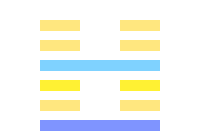
51.1.3 (51 > 62) - THE KĂN HEXAGRAM.
- 1. The first line, undivided, shows its subject, when the movement approaches, looking out and around with apprehension, and afterwards smiling and talking cheerfully. There will be good fortune.
- 3. The third line, divided, shows its subject distraught amid the startling movements going on. If those movements excite him to (right) action, there will be no mistake.
51.1.3 (51 > 62) - Shock
One dreams of escape even though one knows that one should not leave before the goal is reached.
Bing DeepL Google Yandex51.1.3 (51 > 62) - Shock
One dreams of escape even though one knows that one should not leave before the goal is reached.
Bing DeepL Google Yandex51.1.3 (51 > 62) - Kán, l’ébranlement
Kán : tonnerre, effroi répandu, crainte.
- 1. Le tonnerre approchant, on est plein d’effroi ; puis, quand il est passé, on sourit et on parle tous ensemble (on passe de la crainte à la joie).
- 3. Le tonnerre émeut, agite ; il pousse à agir justement.
51.1.3 (51 > 62) - Le choc
On rêve d'évasion bien que l'on sache qu'il ne faut pas partir avant que le but ne soit atteint.
Bing DeepL Google Yandex51.1.3 (51 > 62) - Megrázkódtatás
- 1. Nevethet miután meglátja.
- 3. Meglátva a szakadást otthagyja őket.
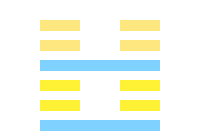
51.2.3 (51 > 34) - THE KĂN HEXAGRAM.
- 2. The second line, divided, shows its subject, when the movement approaches, in a position of peril. He judges it better to let go the articles (in his possession), and to ascend a very lofty height. There is no occasion for him to pursue after (the things he has let go) ; in seven days he will find them.
- 3. The third line, divided, shows its subject distraught amid the startling movements going on. If those movements excite him to (right) action, there will be no mistake.
51.2.3 (51 > 34) - Shock
One makes a summary to explain to others what it is about.
Bing DeepL Google Yandex51.2.3 (51 > 34) - Shock
One makes a summary to explain to others what it is about.
Bing DeepL Google Yandex51.2.3 (51 > 34) - Kán, l’ébranlement
Kán : tonnerre, effroi répandu, crainte.
- 2. Quand le tonnerre gronde, le danger arrive, on croit devoir tout abandonner et se retirer en un lieu sûr et élevé. Qu’on ne s’obstine pas à rechercher alors ce qu’on a abandonné ; on le retrouvera quelque temps après. (Quand le danger sera passé.)
- 3. Le tonnerre émeut, agite ; il pousse à agir justement.
51.2.3 (51 > 34) - Le choc
On fait un résumé pour expliquer aux autres de quoi il s'agit.
Bing DeepL Google Yandex51.2.3 (51 > 34) - Megrázkódtatás
- 2. Ne keresse ami elveszett.
- 3. Meglátva a szakadást otthagyja őket.
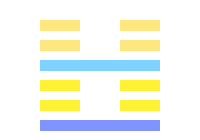
51.1.2.3 (51 > 32) - THE KĂN HEXAGRAM.
- 1. The first line, undivided, shows its subject, when the movement approaches, looking out and around with apprehension, and afterwards smiling and talking cheerfully. There will be good fortune.
- 2. The second line, divided, shows its subject, when the movement approaches, in a position of peril. He judges it better to let go the articles (in his possession), and to ascend a very lofty height. There is no occasion for him to pursue after (the things he has let go) ; in seven days he will find them.
- 3. The third line, divided, shows its subject distraught amid the startling movements going on. If those movements excite him to (right) action, there will be no mistake.
51.1.2.3 (51 > 32) - Shock
One catches up on idle talk to make it possible.
Bing DeepL Google Yandex51.1.2.3 (51 > 32) - Shock
One catches up on idle talk to make it possible.
Bing DeepL Google Yandex51.1.2.3 (51 > 32) - Kán, l’ébranlement
Kán : tonnerre, effroi répandu, crainte.
- 1. Le tonnerre approchant, on est plein d’effroi ; puis, quand il est passé, on sourit et on parle tous ensemble (on passe de la crainte à la joie).
- 2. Quand le tonnerre gronde, le danger arrive, on croit devoir tout abandonner et se retirer en un lieu sûr et élevé. Qu’on ne s’obstine pas à rechercher alors ce qu’on a abandonné ; on le retrouvera quelque temps après. (Quand le danger sera passé.)
- 3. Le tonnerre émeut, agite ; il pousse à agir justement.
51.1.2.3 (51 > 32) - Le choc
On rattrape des paroles en l'air pour les rendre possibles.
Bing DeepL Google Yandex51.1.2.3 (51 > 32) - Megrázkódtatás
- 1. Nevethet miután meglátja.
- 2. Ne keresse ami elveszett.
- 3. Meglátva a szakadást otthagyja őket.

51.3.4 (51 > 36) - THE KĂN HEXAGRAM.
- 3. The third line, divided, shows its subject distraught amid the startling movements going on. If those movements excite him to (right) action, there will be no mistake.
- 4. The fourth line, undivided, shows its subject, amid the startling movements, supinely sinking (deeper) in the mud.
51.3.4 (51 > 36) - Shock
One returns to surprise those who thought one had disappeared.
Bing DeepL Google Yandex51.3.4 (51 > 36) - Shock
One returns to surprise those who thought one had disappeared.
Bing DeepL Google Yandex51.3.4 (51 > 36) - Kán, l’ébranlement
Kán : tonnerre, effroi répandu, crainte.
- 3. Le tonnerre émeut, agite ; il pousse à agir justement.
- 4. Le tonnerre approchant trouble et interdit [avant même l’éclair].
51.3.4 (51 > 36) - Le choc
On revient pour faire une surprise à ceux qui croyaient que l'on avait disparu.
Bing DeepL Google Yandex51.3.4 (51 > 36) - Megrázkódtatás
- 3. Meglátva a szakadást otthagyja őket.
- 4. Meg kell szabadítania magát a többiektől mielőtt tovább mehetne.
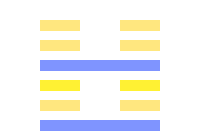
51.1.3.4 (51 > 15) - THE KĂN HEXAGRAM.
- 1. The first line, undivided, shows its subject, when the movement approaches, looking out and around with apprehension, and afterwards smiling and talking cheerfully. There will be good fortune.
- 3. The third line, divided, shows its subject distraught amid the startling movements going on. If those movements excite him to (right) action, there will be no mistake.
- 4. The fourth line, undivided, shows its subject, amid the startling movements, supinely sinking (deeper) in the mud.
51.1.3.4 (51 > 15) - Shock
One has claimed to be aware of facts that never happened.
Bing DeepL Google Yandex51.1.3.4 (51 > 15) - Shock
One has claimed to be aware of facts that never happened.
Bing DeepL Google Yandex51.1.3.4 (51 > 15) - Kán, l’ébranlement
Kán : tonnerre, effroi répandu, crainte.
- 1. Le tonnerre approchant, on est plein d’effroi ; puis, quand il est passé, on sourit et on parle tous ensemble (on passe de la crainte à la joie).
- 3. Le tonnerre émeut, agite ; il pousse à agir justement.
- 4. Le tonnerre approchant trouble et interdit [avant même l’éclair].
51.1.3.4 (51 > 15) - Le choc
On a prétendu être au courant de faits qui ne se sont jamais produits.
Bing DeepL Google Yandex51.1.3.4 (51 > 15) - Megrázkódtatás
- 1. Nevethet miután meglátja.
- 3. Meglátva a szakadást otthagyja őket.
- 4. Meg kell szabadítania magát a többiektől mielőtt tovább mehetne.
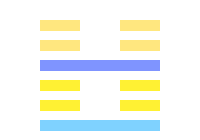
51.2.3.4 (51 > 11) - THE KĂN HEXAGRAM.
- 2. The second line, divided, shows its subject, when the movement approaches, in a position of peril. He judges it better to let go the articles (in his possession), and to ascend a very lofty height. There is no occasion for him to pursue after (the things he has let go) ; in seven days he will find them.
- 3. The third line, divided, shows its subject distraught amid the startling movements going on. If those movements excite him to (right) action, there will be no mistake.
- 4. The fourth line, undivided, shows its subject, amid the startling movements, supinely sinking (deeper) in the mud.
51.2.3.4 (51 > 11) - Shock
One is hard hit by the amount of work one has had to face.
Bing DeepL Google Yandex51.2.3.4 (51 > 11) - Shock
One is hard hit by the amount of work one has had to face.
Bing DeepL Google Yandex51.2.3.4 (51 > 11) - Kán, l’ébranlement
Kán : tonnerre, effroi répandu, crainte.
- 2. Quand le tonnerre gronde, le danger arrive, on croit devoir tout abandonner et se retirer en un lieu sûr et élevé. Qu’on ne s’obstine pas à rechercher alors ce qu’on a abandonné ; on le retrouvera quelque temps après. (Quand le danger sera passé.)
- 3. Le tonnerre émeut, agite ; il pousse à agir justement.
- 4. Le tonnerre approchant trouble et interdit [avant même l’éclair].
51.2.3.4 (51 > 11) - Le choc
On est éprouvé par la somme de travail que l'on a dû affronter.
Bing DeepL Google Yandex51.2.3.4 (51 > 11) - Megrázkódtatás
- 2. Ne keresse ami elveszett.
- 3. Meglátva a szakadást otthagyja őket.
- 4. Meg kell szabadítania magát a többiektől mielőtt tovább mehetne.
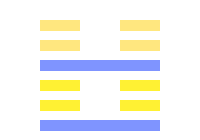
51.1.2.3.4 (51 > 46) - THE KĂN HEXAGRAM.
- 1. The first line, undivided, shows its subject, when the movement approaches, looking out and around with apprehension, and afterwards smiling and talking cheerfully. There will be good fortune.
- 2. The second line, divided, shows its subject, when the movement approaches, in a position of peril. He judges it better to let go the articles (in his possession), and to ascend a very lofty height. There is no occasion for him to pursue after (the things he has let go) ; in seven days he will find them.
- 3. The third line, divided, shows its subject distraught amid the startling movements going on. If those movements excite him to (right) action, there will be no mistake.
- 4. The fourth line, undivided, shows its subject, amid the startling movements, supinely sinking (deeper) in the mud.
51.1.2.3.4 (51 > 46) - Shock
One gets enthusiastic, so one proves right to those who reveal intimate details.
Bing DeepL Google Yandex51.1.2.3.4 (51 > 46) - Shock
One gets enthusiastic, so one proves right to those who reveal intimate details.
Bing DeepL Google Yandex51.1.2.3.4 (51 > 46) - Kán, l’ébranlement
Kán : tonnerre, effroi répandu, crainte.
- 1. Le tonnerre approchant, on est plein d’effroi ; puis, quand il est passé, on sourit et on parle tous ensemble (on passe de la crainte à la joie).
- 2. Quand le tonnerre gronde, le danger arrive, on croit devoir tout abandonner et se retirer en un lieu sûr et élevé. Qu’on ne s’obstine pas à rechercher alors ce qu’on a abandonné ; on le retrouvera quelque temps après. (Quand le danger sera passé.)
- 3. Le tonnerre émeut, agite ; il pousse à agir justement.
- 4. Le tonnerre approchant trouble et interdit [avant même l’éclair].
51.1.2.3.4 (51 > 46) - Le choc
On s'enthousiasme alors on donne raison à ceux qui dévoilent des détails intimes.
Bing DeepL Google Yandex51.1.2.3.4 (51 > 46) - Megrázkódtatás
- 1. Nevethet miután meglátja.
- 2. Ne keresse ami elveszett.
- 3. Meglátva a szakadást otthagyja őket.
- 4. Meg kell szabadítania magát a többiektől mielőtt tovább mehetne.
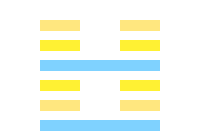
51.3.5 (51 > 49) - THE KĂN HEXAGRAM.
- 3. The third line, divided, shows its subject distraught amid the startling movements going on. If those movements excite him to (right) action, there will be no mistake.
- 5. The fifth line, divided, shows its subject going and coming amidst the startling movements (of the time), and always in peril ; but perhaps he will not incur loss, and find business (which he can accomplish).
51.3.5 (51 > 49) - Shock
One and those who have taken the liberty to make empty promises are like two peas in the pod.
Bing DeepL Google Yandex51.3.5 (51 > 49) - Shock
One and those who have taken the liberty to make empty promises are like two peas in the pod.
Bing DeepL Google Yandex51.3.5 (51 > 49) - Kán, l’ébranlement
Kán : tonnerre, effroi répandu, crainte.
- 3. Le tonnerre émeut, agite ; il pousse à agir justement.
- 5. Le tonnerre allant et venant répand l’effroi ; mais on doit tâcher de ne pas abandonner les affaires entreprises. Même dans le danger pressant, on doit garder le milieu.
51.3.5 (51 > 49) - Le choc
On ressemble comme deux gouttes d'eau à ceux qui ont pris la liberté de faire des promesses en l'air.
Bing DeepL Google Yandex51.3.5 (51 > 49) - Megrázkódtatás
- 3. Meglátva a szakadást otthagyja őket.
- 5. Szilárdan áll a megrázkódtatás kezdetekor és végigkíséri a többieket míg véget nem ér.
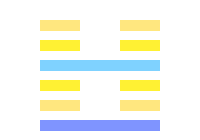
51.1.3.5 (51 > 31) - THE KĂN HEXAGRAM.
- 1. The first line, undivided, shows its subject, when the movement approaches, looking out and around with apprehension, and afterwards smiling and talking cheerfully. There will be good fortune.
- 3. The third line, divided, shows its subject distraught amid the startling movements going on. If those movements excite him to (right) action, there will be no mistake.
- 5. The fifth line, divided, shows its subject going and coming amidst the startling movements (of the time), and always in peril ; but perhaps he will not incur loss, and find business (which he can accomplish).
51.1.3.5 (51 > 31) - Shock
One has received invaluable help and is striving to preserve it for a long time.
Bing DeepL Google Yandex51.1.3.5 (51 > 31) - Shock
One has received invaluable help and is striving to preserve it for a long time.
Bing DeepL Google Yandex51.1.3.5 (51 > 31) - Kán, l’ébranlement
Kán : tonnerre, effroi répandu, crainte.
- 1. Le tonnerre approchant, on est plein d’effroi ; puis, quand il est passé, on sourit et on parle tous ensemble (on passe de la crainte à la joie).
- 3. Le tonnerre émeut, agite ; il pousse à agir justement.
- 5. Le tonnerre allant et venant répand l’effroi ; mais on doit tâcher de ne pas abandonner les affaires entreprises. Même dans le danger pressant, on doit garder le milieu.
51.1.3.5 (51 > 31) - Le choc
On a reçu une aide inestimable que l'on s'efforce de préserver longtemps.
Bing DeepL Google Yandex51.1.3.5 (51 > 31) - Megrázkódtatás
- 1. Nevethet miután meglátja.
- 3. Meglátva a szakadást otthagyja őket.
- 5. Szilárdan áll a megrázkódtatás kezdetekor és végigkíséri a többieket míg véget nem ér.
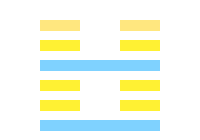
51.2.3.5 (51 > 43) - THE KĂN HEXAGRAM.
- 2. The second line, divided, shows its subject, when the movement approaches, in a position of peril. He judges it better to let go the articles (in his possession), and to ascend a very lofty height. There is no occasion for him to pursue after (the things he has let go) ; in seven days he will find them.
- 3. The third line, divided, shows its subject distraught amid the startling movements going on. If those movements excite him to (right) action, there will be no mistake.
- 5. The fifth line, divided, shows its subject going and coming amidst the startling movements (of the time), and always in peril ; but perhaps he will not incur loss, and find business (which he can accomplish).
51.2.3.5 (51 > 43) - Shock
One lets others believe that their chances of winning are almost nil.
Bing DeepL Google Yandex51.2.3.5 (51 > 43) - Shock
One lets others believe that their chances of winning are almost nil.
Bing DeepL Google Yandex51.2.3.5 (51 > 43) - Kán, l’ébranlement
Kán : tonnerre, effroi répandu, crainte.
- 2. Quand le tonnerre gronde, le danger arrive, on croit devoir tout abandonner et se retirer en un lieu sûr et élevé. Qu’on ne s’obstine pas à rechercher alors ce qu’on a abandonné ; on le retrouvera quelque temps après. (Quand le danger sera passé.)
- 3. Le tonnerre émeut, agite ; il pousse à agir justement.
- 5. Le tonnerre allant et venant répand l’effroi ; mais on doit tâcher de ne pas abandonner les affaires entreprises. Même dans le danger pressant, on doit garder le milieu.
51.2.3.5 (51 > 43) - Le choc
On laisse les autres croire que leurs chances de l'emporter sont quasiment nulles.
Bing DeepL Google Yandex51.2.3.5 (51 > 43) - Megrázkódtatás
- 2. Ne keresse ami elveszett.
- 3. Meglátva a szakadást otthagyja őket.
- 5. Szilárdan áll a megrázkódtatás kezdetekor és végigkíséri a többieket míg véget nem ér.
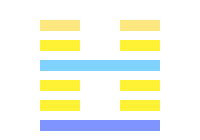
51.1.2.3.5 (51 > 28) - THE KĂN HEXAGRAM.
- 1. The first line, undivided, shows its subject, when the movement approaches, looking out and around with apprehension, and afterwards smiling and talking cheerfully. There will be good fortune.
- 2. The second line, divided, shows its subject, when the movement approaches, in a position of peril. He judges it better to let go the articles (in his possession), and to ascend a very lofty height. There is no occasion for him to pursue after (the things he has let go) ; in seven days he will find them.
- 3. The third line, divided, shows its subject distraught amid the startling movements going on. If those movements excite him to (right) action, there will be no mistake.
- 5. The fifth line, divided, shows its subject going and coming amidst the startling movements (of the time), and always in peril ; but perhaps he will not incur loss, and find business (which he can accomplish).
51.1.2.3.5 (51 > 28) - Shock
One tempers one's enthusiasm because others have not been so lucky.
Bing DeepL Google Yandex51.1.2.3.5 (51 > 28) - Shock
One tempers one's enthusiasm because others have not been so lucky.
Bing DeepL Google Yandex51.1.2.3.5 (51 > 28) - Kán, l’ébranlement
Kán : tonnerre, effroi répandu, crainte.
- 1. Le tonnerre approchant, on est plein d’effroi ; puis, quand il est passé, on sourit et on parle tous ensemble (on passe de la crainte à la joie).
- 2. Quand le tonnerre gronde, le danger arrive, on croit devoir tout abandonner et se retirer en un lieu sûr et élevé. Qu’on ne s’obstine pas à rechercher alors ce qu’on a abandonné ; on le retrouvera quelque temps après. (Quand le danger sera passé.)
- 3. Le tonnerre émeut, agite ; il pousse à agir justement.
- 5. Le tonnerre allant et venant répand l’effroi ; mais on doit tâcher de ne pas abandonner les affaires entreprises. Même dans le danger pressant, on doit garder le milieu.
51.1.2.3.5 (51 > 28) - Le choc
On tempère son enthousiasme car les autres n'ont pas eu autant de chance.
Bing DeepL Google Yandex51.1.2.3.5 (51 > 28) - Megrázkódtatás
- 1. Nevethet miután meglátja.
- 2. Ne keresse ami elveszett.
- 3. Meglátva a szakadást otthagyja őket.
- 5. Szilárdan áll a megrázkódtatás kezdetekor és végigkíséri a többieket míg véget nem ér.
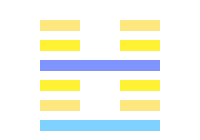
51.3.4.5 (51 > 63) - THE KĂN HEXAGRAM.
- 3. The third line, divided, shows its subject distraught amid the startling movements going on. If those movements excite him to (right) action, there will be no mistake.
- 4. The fourth line, undivided, shows its subject, amid the startling movements, supinely sinking (deeper) in the mud.
- 5. The fifth line, divided, shows its subject going and coming amidst the startling movements (of the time), and always in peril ; but perhaps he will not incur loss, and find business (which he can accomplish).
51.3.4.5 (51 > 63) - Shock
One makes more effort than necessary because one came here to let off some steam.
Bing DeepL Google Yandex51.3.4.5 (51 > 63) - Shock
One makes more effort than necessary because one came here to let off some steam.
Bing DeepL Google Yandex51.3.4.5 (51 > 63) - Kán, l’ébranlement
Kán : tonnerre, effroi répandu, crainte.
- 3. Le tonnerre émeut, agite ; il pousse à agir justement.
- 4. Le tonnerre approchant trouble et interdit [avant même l’éclair].
- 5. Le tonnerre allant et venant répand l’effroi ; mais on doit tâcher de ne pas abandonner les affaires entreprises. Même dans le danger pressant, on doit garder le milieu.
51.3.4.5 (51 > 63) - Le choc
On fait plus d'efforts que nécessaire car on est venu pour se défouler.
Bing DeepL Google Yandex51.3.4.5 (51 > 63) - Megrázkódtatás
- 3. Meglátva a szakadást otthagyja őket.
- 4. Meg kell szabadítania magát a többiektől mielőtt tovább mehetne.
- 5. Szilárdan áll a megrázkódtatás kezdetekor és végigkíséri a többieket míg véget nem ér.
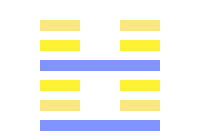
51.1.3.4.5 (51 > 39) - THE KĂN HEXAGRAM.
- 1. The first line, undivided, shows its subject, when the movement approaches, looking out and around with apprehension, and afterwards smiling and talking cheerfully. There will be good fortune.
- 3. The third line, divided, shows its subject distraught amid the startling movements going on. If those movements excite him to (right) action, there will be no mistake.
- 4. The fourth line, undivided, shows its subject, amid the startling movements, supinely sinking (deeper) in the mud.
- 5. The fifth line, divided, shows its subject going and coming amidst the startling movements (of the time), and always in peril ; but perhaps he will not incur loss, and find business (which he can accomplish).
51.1.3.4.5 (51 > 39) - Shock
One returns empty-handed because one didn't understand what means to use.
Bing DeepL Google Yandex51.1.3.4.5 (51 > 39) - Shock
One returns empty-handed because one didn't understand what means to use.
Bing DeepL Google Yandex51.1.3.4.5 (51 > 39) - Kán, l’ébranlement
Kán : tonnerre, effroi répandu, crainte.
- 1. Le tonnerre approchant, on est plein d’effroi ; puis, quand il est passé, on sourit et on parle tous ensemble (on passe de la crainte à la joie).
- 3. Le tonnerre émeut, agite ; il pousse à agir justement.
- 4. Le tonnerre approchant trouble et interdit [avant même l’éclair].
- 5. Le tonnerre allant et venant répand l’effroi ; mais on doit tâcher de ne pas abandonner les affaires entreprises. Même dans le danger pressant, on doit garder le milieu.
51.1.3.4.5 (51 > 39) - Le choc
On rentre bredouille car on n'a pas compris quels moyens il fallait employer.
Bing DeepL Google Yandex51.1.3.4.5 (51 > 39) - Megrázkódtatás
- 1. Nevethet miután meglátja.
- 3. Meglátva a szakadást otthagyja őket.
- 4. Meg kell szabadítania magát a többiektől mielőtt tovább mehetne.
- 5. Szilárdan áll a megrázkódtatás kezdetekor és végigkíséri a többieket míg véget nem ér.
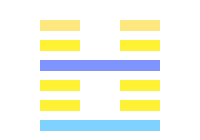
51.2.3.4.5 (51 > 5) - THE KĂN HEXAGRAM.
- 2. The second line, divided, shows its subject, when the movement approaches, in a position of peril. He judges it better to let go the articles (in his possession), and to ascend a very lofty height. There is no occasion for him to pursue after (the things he has let go) ; in seven days he will find them.
- 3. The third line, divided, shows its subject distraught amid the startling movements going on. If those movements excite him to (right) action, there will be no mistake.
- 4. The fourth line, undivided, shows its subject, amid the startling movements, supinely sinking (deeper) in the mud.
- 5. The fifth line, divided, shows its subject going and coming amidst the startling movements (of the time), and always in peril ; but perhaps he will not incur loss, and find business (which he can accomplish).
51.2.3.4.5 (51 > 5) - Kán, l’ébranlement
Kán : tonnerre, effroi répandu, crainte.
- 2. Quand le tonnerre gronde, le danger arrive, on croit devoir tout abandonner et se retirer en un lieu sûr et élevé. Qu’on ne s’obstine pas à rechercher alors ce qu’on a abandonné ; on le retrouvera quelque temps après. (Quand le danger sera passé.)
- 3. Le tonnerre émeut, agite ; il pousse à agir justement.
- 4. Le tonnerre approchant trouble et interdit [avant même l’éclair].
- 5. Le tonnerre allant et venant répand l’effroi ; mais on doit tâcher de ne pas abandonner les affaires entreprises. Même dans le danger pressant, on doit garder le milieu.
51.2.3.4.5 (51 > 5) - Le choc
On s'envoie des messages destinés à se rassurer mutuellement.
Bing DeepL Google Yandex51.2.3.4.5 (51 > 5) - Megrázkódtatás
- 2. Ne keresse ami elveszett.
- 3. Meglátva a szakadást otthagyja őket.
- 4. Meg kell szabadítania magát a többiektől mielőtt tovább mehetne.
- 5. Szilárdan áll a megrázkódtatás kezdetekor és végigkíséri a többieket míg véget nem ér.
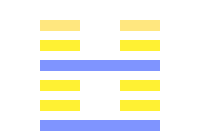
51.1.2.3.4.5 (51 > 48) - THE KĂN HEXAGRAM.
- 1. The first line, undivided, shows its subject, when the movement approaches, looking out and around with apprehension, and afterwards smiling and talking cheerfully. There will be good fortune.
- 2. The second line, divided, shows its subject, when the movement approaches, in a position of peril. He judges it better to let go the articles (in his possession), and to ascend a very lofty height. There is no occasion for him to pursue after (the things he has let go) ; in seven days he will find them.
- 3. The third line, divided, shows its subject distraught amid the startling movements going on. If those movements excite him to (right) action, there will be no mistake.
- 4. The fourth line, undivided, shows its subject, amid the startling movements, supinely sinking (deeper) in the mud.
- 5. The fifth line, divided, shows its subject going and coming amidst the startling movements (of the time), and always in peril ; but perhaps he will not incur loss, and find business (which he can accomplish).
51.1.2.3.4.5 (51 > 48) - Shock
One is proud to be able to tell others why one should do it like this.
Bing DeepL Google Yandex51.1.2.3.4.5 (51 > 48) - Shock
One is proud to be able to tell others why one should do it like this.
Bing DeepL Google Yandex51.1.2.3.4.5 (51 > 48) - Kán, l’ébranlement
Kán : tonnerre, effroi répandu, crainte.
- 1. Le tonnerre approchant, on est plein d’effroi ; puis, quand il est passé, on sourit et on parle tous ensemble (on passe de la crainte à la joie).
- 2. Quand le tonnerre gronde, le danger arrive, on croit devoir tout abandonner et se retirer en un lieu sûr et élevé. Qu’on ne s’obstine pas à rechercher alors ce qu’on a abandonné ; on le retrouvera quelque temps après. (Quand le danger sera passé.)
- 3. Le tonnerre émeut, agite ; il pousse à agir justement.
- 4. Le tonnerre approchant trouble et interdit [avant même l’éclair].
- 5. Le tonnerre allant et venant répand l’effroi ; mais on doit tâcher de ne pas abandonner les affaires entreprises. Même dans le danger pressant, on doit garder le milieu.
51.1.2.3.4.5 (51 > 48) - Le choc
On est fier de pouvoir dire aux autres pourquoi il faut faire comme ça.
Bing DeepL Google Yandex51.1.2.3.4.5 (51 > 48) - Megrázkódtatás
- 1. Nevethet miután meglátja.
- 2. Ne keresse ami elveszett.
- 3. Meglátva a szakadást otthagyja őket.
- 4. Meg kell szabadítania magát a többiektől mielőtt tovább mehetne.
- 5. Szilárdan áll a megrázkódtatás kezdetekor és végigkíséri a többieket míg véget nem ér.
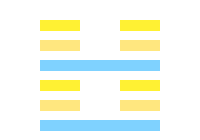
51.3.6 (51 > 30) - THE KĂN HEXAGRAM.
- 3. The third line, divided, shows its subject distraught amid the startling movements going on. If those movements excite him to (right) action, there will be no mistake.
- 6. The topmost line, divided, shows its subject, amidst the startling movements (of the time), in breathless dismay and looking round him with trembling apprehension. If he take action, there will be evil. If, while the startling movements have not reached his own person and his neighbourhood, (he were to take precautions), there would be no error, though his relatives might (still) speak against him.
51.3.6 (51 > 30) - Shock
One is dying to tell others what one really thinks of them.
Bing DeepL Google Yandex51.3.6 (51 > 30) - Shock
One is dying to tell others what one really thinks of them.
Bing DeepL Google Yandex51.3.6 (51 > 30) - Kán, l’ébranlement
Kán : tonnerre, effroi répandu, crainte.
- 3. Le tonnerre émeut, agite ; il pousse à agir justement.
-
6. Le tonnerre répand l’effroi et fait partout regarder avec trouble et crainte. S’il atteint et frappe, il causera un grand mal. (Ou : il corrige le mal.) Mais s’il ne frappe ni tel personnage, ni ses voisins, ce ne sera point un mal et fera seulement jaser les habitants d’une même maison.
Quand le tonnerre gronde, que l’orage éclate, le sage recherche la cause de ce fait (et tâche de profiter de l’avertissement céleste).
51.3.6 (51 > 30) - Le choc
On crève d'envie de dire aux autres ce qu'on pense vraiment d'eux.
Bing DeepL Google Yandex51.3.6 (51 > 30) - Megrázkódtatás
- 3. Meglátva a szakadást otthagyja őket.
- 6. Elvesztette a leggyengébbet, visszafogottnak kell maradnia míg nem változnak.
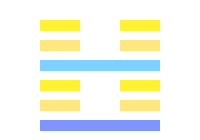
51.1.3.6 (51 > 56) - THE KĂN HEXAGRAM.
- 1. The first line, undivided, shows its subject, when the movement approaches, looking out and around with apprehension, and afterwards smiling and talking cheerfully. There will be good fortune.
- 3. The third line, divided, shows its subject distraught amid the startling movements going on. If those movements excite him to (right) action, there will be no mistake.
- 6. The topmost line, divided, shows its subject, amidst the startling movements (of the time), in breathless dismay and looking round him with trembling apprehension. If he take action, there will be evil. If, while the startling movements have not reached his own person and his neighbourhood, (he were to take precautions), there would be no error, though his relatives might (still) speak against him.
51.1.3.6 (51 > 56) - Shock
One loses one's pursuers by making them take another road.
Bing DeepL Google Yandex51.1.3.6 (51 > 56) - Shock
One loses one's pursuers by making them take another road.
Bing DeepL Google Yandex51.1.3.6 (51 > 56) - Kán, l’ébranlement
Kán : tonnerre, effroi répandu, crainte.
- 1. Le tonnerre approchant, on est plein d’effroi ; puis, quand il est passé, on sourit et on parle tous ensemble (on passe de la crainte à la joie).
- 3. Le tonnerre émeut, agite ; il pousse à agir justement.
-
6. Le tonnerre répand l’effroi et fait partout regarder avec trouble et crainte. S’il atteint et frappe, il causera un grand mal. (Ou : il corrige le mal.) Mais s’il ne frappe ni tel personnage, ni ses voisins, ce ne sera point un mal et fera seulement jaser les habitants d’une même maison.
Quand le tonnerre gronde, que l’orage éclate, le sage recherche la cause de ce fait (et tâche de profiter de l’avertissement céleste).
51.1.3.6 (51 > 56) - Le choc
On sème ses poursuivants en leur faisant prendre une autre route.
Bing DeepL Google Yandex51.1.3.6 (51 > 56) - Megrázkódtatás
- 1. Nevethet miután meglátja.
- 3. Meglátva a szakadást otthagyja őket.
- 6. Elvesztette a leggyengébbet, visszafogottnak kell maradnia míg nem változnak.
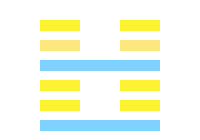
51.2.3.6 (51 > 14) - THE KĂN HEXAGRAM.
- 2. The second line, divided, shows its subject, when the movement approaches, in a position of peril. He judges it better to let go the articles (in his possession), and to ascend a very lofty height. There is no occasion for him to pursue after (the things he has let go) ; in seven days he will find them.
- 3. The third line, divided, shows its subject distraught amid the startling movements going on. If those movements excite him to (right) action, there will be no mistake.
- 6. The topmost line, divided, shows its subject, amidst the startling movements (of the time), in breathless dismay and looking round him with trembling apprehension. If he take action, there will be evil. If, while the startling movements have not reached his own person and his neighbourhood, (he were to take precautions), there would be no error, though his relatives might (still) speak against him.
51.2.3.6 (51 > 14) - Shock
One tries to understand why others have not yet arrived.
Bing DeepL Google Yandex51.2.3.6 (51 > 14) - Shock
One tries to understand why others have not yet arrived.
Bing DeepL Google Yandex51.2.3.6 (51 > 14) - Kán, l’ébranlement
Kán : tonnerre, effroi répandu, crainte.
- 2. Quand le tonnerre gronde, le danger arrive, on croit devoir tout abandonner et se retirer en un lieu sûr et élevé. Qu’on ne s’obstine pas à rechercher alors ce qu’on a abandonné ; on le retrouvera quelque temps après. (Quand le danger sera passé.)
- 3. Le tonnerre émeut, agite ; il pousse à agir justement.
-
6. Le tonnerre répand l’effroi et fait partout regarder avec trouble et crainte. S’il atteint et frappe, il causera un grand mal. (Ou : il corrige le mal.) Mais s’il ne frappe ni tel personnage, ni ses voisins, ce ne sera point un mal et fera seulement jaser les habitants d’une même maison.
Quand le tonnerre gronde, que l’orage éclate, le sage recherche la cause de ce fait (et tâche de profiter de l’avertissement céleste).
51.2.3.6 (51 > 14) - Le choc
On cherche à comprendre pourquoi les autres ne sont pas encore arrivés.
Bing DeepL Google Yandex51.2.3.6 (51 > 14) - Megrázkódtatás
- 2. Ne keresse ami elveszett.
- 3. Meglátva a szakadást otthagyja őket.
- 6. Elvesztette a leggyengébbet, visszafogottnak kell maradnia míg nem változnak.
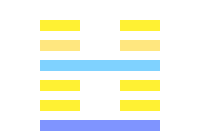
51.1.2.3.6 (51 > 50) - THE KĂN HEXAGRAM.
- 1. The first line, undivided, shows its subject, when the movement approaches, looking out and around with apprehension, and afterwards smiling and talking cheerfully. There will be good fortune.
- 2. The second line, divided, shows its subject, when the movement approaches, in a position of peril. He judges it better to let go the articles (in his possession), and to ascend a very lofty height. There is no occasion for him to pursue after (the things he has let go) ; in seven days he will find them.
- 3. The third line, divided, shows its subject distraught amid the startling movements going on. If those movements excite him to (right) action, there will be no mistake.
- 6. The topmost line, divided, shows its subject, amidst the startling movements (of the time), in breathless dismay and looking round him with trembling apprehension. If he take action, there will be evil. If, while the startling movements have not reached his own person and his neighbourhood, (he were to take precautions), there would be no error, though his relatives might (still) speak against him.
51.1.2.3.6 (51 > 50) - Shock
One is bustling around those who have planned to get carried away.
Bing DeepL Google Yandex51.1.2.3.6 (51 > 50) - Shock
One is bustling around those who have planned to get carried away.
Bing DeepL Google Yandex51.1.2.3.6 (51 > 50) - Kán, l’ébranlement
Kán : tonnerre, effroi répandu, crainte.
- 1. Le tonnerre approchant, on est plein d’effroi ; puis, quand il est passé, on sourit et on parle tous ensemble (on passe de la crainte à la joie).
- 2. Quand le tonnerre gronde, le danger arrive, on croit devoir tout abandonner et se retirer en un lieu sûr et élevé. Qu’on ne s’obstine pas à rechercher alors ce qu’on a abandonné ; on le retrouvera quelque temps après. (Quand le danger sera passé.)
- 3. Le tonnerre émeut, agite ; il pousse à agir justement.
-
6. Le tonnerre répand l’effroi et fait partout regarder avec trouble et crainte. S’il atteint et frappe, il causera un grand mal. (Ou : il corrige le mal.) Mais s’il ne frappe ni tel personnage, ni ses voisins, ce ne sera point un mal et fera seulement jaser les habitants d’une même maison.
Quand le tonnerre gronde, que l’orage éclate, le sage recherche la cause de ce fait (et tâche de profiter de l’avertissement céleste).
51.1.2.3.6 (51 > 50) - Le choc
On s'affaire autour de ceux qui ont prévu de se laisser emporter.
Bing DeepL Google Yandex51.1.2.3.6 (51 > 50) - Megrázkódtatás
- 1. Nevethet miután meglátja.
- 2. Ne keresse ami elveszett.
- 3. Meglátva a szakadást otthagyja őket.
- 6. Elvesztette a leggyengébbet, visszafogottnak kell maradnia míg nem változnak.
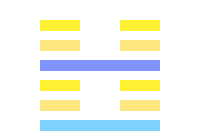
51.3.4.6 (51 > 22) - THE KĂN HEXAGRAM.
- 3. The third line, divided, shows its subject distraught amid the startling movements going on. If those movements excite him to (right) action, there will be no mistake.
- 4. The fourth line, undivided, shows its subject, amid the startling movements, supinely sinking (deeper) in the mud.
- 6. The topmost line, divided, shows its subject, amidst the startling movements (of the time), in breathless dismay and looking round him with trembling apprehension. If he take action, there will be evil. If, while the startling movements have not reached his own person and his neighbourhood, (he were to take precautions), there would be no error, though his relatives might (still) speak against him.
51.3.4.6 (51 > 22) - Shock
One weighs one' s words before making comments that can be humiliating for one' s interlocutors.
Bing DeepL Google Yandex51.3.4.6 (51 > 22) - Shock
One weighs one' s words before making comments that can be humiliating for one' s interlocutors.
Bing DeepL Google Yandex51.3.4.6 (51 > 22) - Kán, l’ébranlement
Kán : tonnerre, effroi répandu, crainte.
- 3. Le tonnerre émeut, agite ; il pousse à agir justement.
- 4. Le tonnerre approchant trouble et interdit [avant même l’éclair].
-
6. Le tonnerre répand l’effroi et fait partout regarder avec trouble et crainte. S’il atteint et frappe, il causera un grand mal. (Ou : il corrige le mal.) Mais s’il ne frappe ni tel personnage, ni ses voisins, ce ne sera point un mal et fera seulement jaser les habitants d’une même maison.
Quand le tonnerre gronde, que l’orage éclate, le sage recherche la cause de ce fait (et tâche de profiter de l’avertissement céleste).
51.3.4.6 (51 > 22) - Le choc
On pèse ses mots avant de tenir des propos qui peuvent être humiliants pour ses interlocuteurs.
Bing DeepL Google Yandex51.3.4.6 (51 > 22) - Megrázkódtatás
- 3. Meglátva a szakadást otthagyja őket.
- 4. Meg kell szabadítania magát a többiektől mielőtt tovább mehetne.
- 6. Elvesztette a leggyengébbet, visszafogottnak kell maradnia míg nem változnak.
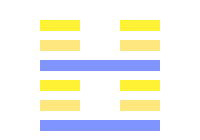
51.1.3.4.6 (51 > 52) - THE KĂN HEXAGRAM.
- 1. The first line, undivided, shows its subject, when the movement approaches, looking out and around with apprehension, and afterwards smiling and talking cheerfully. There will be good fortune.
- 3. The third line, divided, shows its subject distraught amid the startling movements going on. If those movements excite him to (right) action, there will be no mistake.
- 4. The fourth line, undivided, shows its subject, amid the startling movements, supinely sinking (deeper) in the mud.
- 6. The topmost line, divided, shows its subject, amidst the startling movements (of the time), in breathless dismay and looking round him with trembling apprehension. If he take action, there will be evil. If, while the startling movements have not reached his own person and his neighbourhood, (he were to take precautions), there would be no error, though his relatives might (still) speak against him.
51.1.3.4.6 (51 > 52) - Shock
One indulges in shenanigans so as not to be regarded as all and sundry.
Bing DeepL Google Yandex51.1.3.4.6 (51 > 52) - Shock
One indulges in shenanigans so as not to be regarded as all and sundry.
Bing DeepL Google Yandex51.1.3.4.6 (51 > 52) - Kán, l’ébranlement
Kán : tonnerre, effroi répandu, crainte.
- 1. Le tonnerre approchant, on est plein d’effroi ; puis, quand il est passé, on sourit et on parle tous ensemble (on passe de la crainte à la joie).
- 3. Le tonnerre émeut, agite ; il pousse à agir justement.
- 4. Le tonnerre approchant trouble et interdit [avant même l’éclair].
-
6. Le tonnerre répand l’effroi et fait partout regarder avec trouble et crainte. S’il atteint et frappe, il causera un grand mal. (Ou : il corrige le mal.) Mais s’il ne frappe ni tel personnage, ni ses voisins, ce ne sera point un mal et fera seulement jaser les habitants d’une même maison.
Quand le tonnerre gronde, que l’orage éclate, le sage recherche la cause de ce fait (et tâche de profiter de l’avertissement céleste).
51.1.3.4.6 (51 > 52) - Le choc
On se complaît à faire des frasques pour ne pas être considéré comme le tout-venant.
Bing DeepL Google Yandex51.1.3.4.6 (51 > 52) - Megrázkódtatás
- 1. Nevethet miután meglátja.
- 3. Meglátva a szakadást otthagyja őket.
- 4. Meg kell szabadítania magát a többiektől mielőtt tovább mehetne.
- 6. Elvesztette a leggyengébbet, visszafogottnak kell maradnia míg nem változnak.
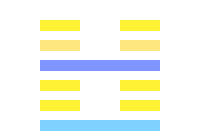
51.2.3.4.6 (51 > 26) - THE KĂN HEXAGRAM.
- 2. The second line, divided, shows its subject, when the movement approaches, in a position of peril. He judges it better to let go the articles (in his possession), and to ascend a very lofty height. There is no occasion for him to pursue after (the things he has let go) ; in seven days he will find them.
- 3. The third line, divided, shows its subject distraught amid the startling movements going on. If those movements excite him to (right) action, there will be no mistake.
- 4. The fourth line, undivided, shows its subject, amid the startling movements, supinely sinking (deeper) in the mud.
- 6. The topmost line, divided, shows its subject, amidst the startling movements (of the time), in breathless dismay and looking round him with trembling apprehension. If he take action, there will be evil. If, while the startling movements have not reached his own person and his neighbourhood, (he were to take precautions), there would be no error, though his relatives might (still) speak against him.
51.2.3.4.6 (51 > 26) - Shock
One tumbles preconceived ideas by ending one's sentences abruptly.
Bing DeepL Google Yandex51.2.3.4.6 (51 > 26) - Shock
One tumbles preconceived ideas by ending one's sentences abruptly.
Bing DeepL Google Yandex51.2.3.4.6 (51 > 26) - Kán, l’ébranlement
Kán : tonnerre, effroi répandu, crainte.
- 2. Quand le tonnerre gronde, le danger arrive, on croit devoir tout abandonner et se retirer en un lieu sûr et élevé. Qu’on ne s’obstine pas à rechercher alors ce qu’on a abandonné ; on le retrouvera quelque temps après. (Quand le danger sera passé.)
- 3. Le tonnerre émeut, agite ; il pousse à agir justement.
- 4. Le tonnerre approchant trouble et interdit [avant même l’éclair].
-
6. Le tonnerre répand l’effroi et fait partout regarder avec trouble et crainte. S’il atteint et frappe, il causera un grand mal. (Ou : il corrige le mal.) Mais s’il ne frappe ni tel personnage, ni ses voisins, ce ne sera point un mal et fera seulement jaser les habitants d’une même maison.
Quand le tonnerre gronde, que l’orage éclate, le sage recherche la cause de ce fait (et tâche de profiter de l’avertissement céleste).
51.2.3.4.6 (51 > 26) - Le choc
On culbute les idées préconçues en terminant ses phrases de façon abrupte.
Bing DeepL Google Yandex51.2.3.4.6 (51 > 26) - Megrázkódtatás
- 2. Ne keresse ami elveszett.
- 3. Meglátva a szakadást otthagyja őket.
- 4. Meg kell szabadítania magát a többiektől mielőtt tovább mehetne.
- 6. Elvesztette a leggyengébbet, visszafogottnak kell maradnia míg nem változnak.
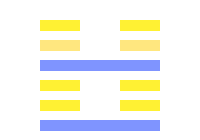
51.1.2.3.4.6 (51 > 18) - THE KĂN HEXAGRAM.
- 1. The first line, undivided, shows its subject, when the movement approaches, looking out and around with apprehension, and afterwards smiling and talking cheerfully. There will be good fortune.
- 2. The second line, divided, shows its subject, when the movement approaches, in a position of peril. He judges it better to let go the articles (in his possession), and to ascend a very lofty height. There is no occasion for him to pursue after (the things he has let go) ; in seven days he will find them.
- 3. The third line, divided, shows its subject distraught amid the startling movements going on. If those movements excite him to (right) action, there will be no mistake.
- 4. The fourth line, undivided, shows its subject, amid the startling movements, supinely sinking (deeper) in the mud.
- 6. The topmost line, divided, shows its subject, amidst the startling movements (of the time), in breathless dismay and looking round him with trembling apprehension. If he take action, there will be evil. If, while the startling movements have not reached his own person and his neighbourhood, (he were to take precautions), there would be no error, though his relatives might (still) speak against him.
51.1.2.3.4.6 (51 > 18) - Shock
One extends one's study to related fields in order to understand how the whole thing works.
Bing DeepL Google Yandex51.1.2.3.4.6 (51 > 18) - Shock
One extends one's study to related fields in order to understand how the whole thing works.
Bing DeepL Google Yandex51.1.2.3.4.6 (51 > 18) - Kán, l’ébranlement
Kán : tonnerre, effroi répandu, crainte.
- 1. Le tonnerre approchant, on est plein d’effroi ; puis, quand il est passé, on sourit et on parle tous ensemble (on passe de la crainte à la joie).
- 2. Quand le tonnerre gronde, le danger arrive, on croit devoir tout abandonner et se retirer en un lieu sûr et élevé. Qu’on ne s’obstine pas à rechercher alors ce qu’on a abandonné ; on le retrouvera quelque temps après. (Quand le danger sera passé.)
- 3. Le tonnerre émeut, agite ; il pousse à agir justement.
- 4. Le tonnerre approchant trouble et interdit [avant même l’éclair].
-
6. Le tonnerre répand l’effroi et fait partout regarder avec trouble et crainte. S’il atteint et frappe, il causera un grand mal. (Ou : il corrige le mal.) Mais s’il ne frappe ni tel personnage, ni ses voisins, ce ne sera point un mal et fera seulement jaser les habitants d’une même maison.
Quand le tonnerre gronde, que l’orage éclate, le sage recherche la cause de ce fait (et tâche de profiter de l’avertissement céleste).
51.1.2.3.4.6 (51 > 18) - Le choc
On étend son étude à des domaines connexes afin de parvenir à comprendre le fonctionnement de l'ensemble.
Bing DeepL Google Yandex51.1.2.3.4.6 (51 > 18) - Megrázkódtatás
- 1. Nevethet miután meglátja.
- 2. Ne keresse ami elveszett.
- 3. Meglátva a szakadást otthagyja őket.
- 4. Meg kell szabadítania magát a többiektől mielőtt tovább mehetne.
- 6. Elvesztette a leggyengébbet, visszafogottnak kell maradnia míg nem változnak.
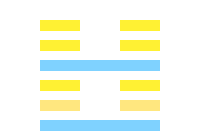
51.3.5.6 (51 > 13) - THE KĂN HEXAGRAM.
- 3. The third line, divided, shows its subject distraught amid the startling movements going on. If those movements excite him to (right) action, there will be no mistake.
- 5. The fifth line, divided, shows its subject going and coming amidst the startling movements (of the time), and always in peril ; but perhaps he will not incur loss, and find business (which he can accomplish).
- 6. The topmost line, divided, shows its subject, amidst the startling movements (of the time), in breathless dismay and looking round him with trembling apprehension. If he take action, there will be evil. If, while the startling movements have not reached his own person and his neighbourhood, (he were to take precautions), there would be no error, though his relatives might (still) speak against him.
51.3.5.6 (51 > 13) - Shock
One challenges the reality of the facts that others claimed to have experienced.
Bing DeepL Google Yandex51.3.5.6 (51 > 13) - Shock
One challenges the reality of the facts that others claimed to have experienced.
Bing DeepL Google Yandex51.3.5.6 (51 > 13) - Kán, l’ébranlement
Kán : tonnerre, effroi répandu, crainte.
- 3. Le tonnerre émeut, agite ; il pousse à agir justement.
- 5. Le tonnerre allant et venant répand l’effroi ; mais on doit tâcher de ne pas abandonner les affaires entreprises. Même dans le danger pressant, on doit garder le milieu.
-
6. Le tonnerre répand l’effroi et fait partout regarder avec trouble et crainte. S’il atteint et frappe, il causera un grand mal. (Ou : il corrige le mal.) Mais s’il ne frappe ni tel personnage, ni ses voisins, ce ne sera point un mal et fera seulement jaser les habitants d’une même maison.
Quand le tonnerre gronde, que l’orage éclate, le sage recherche la cause de ce fait (et tâche de profiter de l’avertissement céleste).
51.3.5.6 (51 > 13) - Le choc
On conteste la réalité des faits que les autres ont prétendu avoir vécu.
Bing DeepL Google Yandex51.3.5.6 (51 > 13) - Megrázkódtatás
- 3. Meglátva a szakadást otthagyja őket.
- 5. Szilárdan áll a megrázkódtatás kezdetekor és végigkíséri a többieket míg véget nem ér.
- 6. Elvesztette a leggyengébbet, visszafogottnak kell maradnia míg nem változnak.
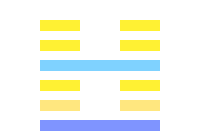
51.1.3.5.6 (51 > 33) - THE KĂN HEXAGRAM.
- 1. The first line, undivided, shows its subject, when the movement approaches, looking out and around with apprehension, and afterwards smiling and talking cheerfully. There will be good fortune.
- 3. The third line, divided, shows its subject distraught amid the startling movements going on. If those movements excite him to (right) action, there will be no mistake.
- 5. The fifth line, divided, shows its subject going and coming amidst the startling movements (of the time), and always in peril ; but perhaps he will not incur loss, and find business (which he can accomplish).
- 6. The topmost line, divided, shows its subject, amidst the startling movements (of the time), in breathless dismay and looking round him with trembling apprehension. If he take action, there will be evil. If, while the startling movements have not reached his own person and his neighbourhood, (he were to take precautions), there would be no error, though his relatives might (still) speak against him.
51.1.3.5.6 (51 > 33) - Shock
One criticizes with great passion the opponents of those one protects.
Bing DeepL Google Yandex51.1.3.5.6 (51 > 33) - Shock
One criticizes with great passion the opponents of those one protects.
Bing DeepL Google Yandex51.1.3.5.6 (51 > 33) - Kán, l’ébranlement
Kán : tonnerre, effroi répandu, crainte.
- 1. Le tonnerre approchant, on est plein d’effroi ; puis, quand il est passé, on sourit et on parle tous ensemble (on passe de la crainte à la joie).
- 3. Le tonnerre émeut, agite ; il pousse à agir justement.
- 5. Le tonnerre allant et venant répand l’effroi ; mais on doit tâcher de ne pas abandonner les affaires entreprises. Même dans le danger pressant, on doit garder le milieu.
-
6. Le tonnerre répand l’effroi et fait partout regarder avec trouble et crainte. S’il atteint et frappe, il causera un grand mal. (Ou : il corrige le mal.) Mais s’il ne frappe ni tel personnage, ni ses voisins, ce ne sera point un mal et fera seulement jaser les habitants d’une même maison.
Quand le tonnerre gronde, que l’orage éclate, le sage recherche la cause de ce fait (et tâche de profiter de l’avertissement céleste).
51.1.3.5.6 (51 > 33) - Le choc
On critique avec ferveur les adversaires de ceux qu'on protège.
Bing DeepL Google Yandex51.1.3.5.6 (51 > 33) - Megrázkódtatás
- 1. Nevethet miután meglátja.
- 3. Meglátva a szakadást otthagyja őket.
- 5. Szilárdan áll a megrázkódtatás kezdetekor és végigkíséri a többieket míg véget nem ér.
- 6. Elvesztette a leggyengébbet, visszafogottnak kell maradnia míg nem változnak.
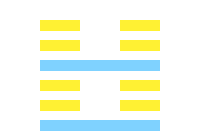
51.2.3.5.6 (51 > 1) - THE KĂN HEXAGRAM.
- 2. The second line, divided, shows its subject, when the movement approaches, in a position of peril. He judges it better to let go the articles (in his possession), and to ascend a very lofty height. There is no occasion for him to pursue after (the things he has let go) ; in seven days he will find them.
- 3. The third line, divided, shows its subject distraught amid the startling movements going on. If those movements excite him to (right) action, there will be no mistake.
- 5. The fifth line, divided, shows its subject going and coming amidst the startling movements (of the time), and always in peril ; but perhaps he will not incur loss, and find business (which he can accomplish).
- 6. The topmost line, divided, shows its subject, amidst the startling movements (of the time), in breathless dismay and looking round him with trembling apprehension. If he take action, there will be evil. If, while the startling movements have not reached his own person and his neighbourhood, (he were to take precautions), there would be no error, though his relatives might (still) speak against him.
51.2.3.5.6 (51 > 1) - Shock
One raises a point to which everybody will agree upon.
Bing DeepL Google Yandex51.2.3.5.6 (51 > 1) - Shock
One raises a point to which everybody will agree upon.
Bing DeepL Google Yandex51.2.3.5.6 (51 > 1) - Kán, l’ébranlement
Kán : tonnerre, effroi répandu, crainte.
- 2. Quand le tonnerre gronde, le danger arrive, on croit devoir tout abandonner et se retirer en un lieu sûr et élevé. Qu’on ne s’obstine pas à rechercher alors ce qu’on a abandonné ; on le retrouvera quelque temps après. (Quand le danger sera passé.)
- 3. Le tonnerre émeut, agite ; il pousse à agir justement.
- 5. Le tonnerre allant et venant répand l’effroi ; mais on doit tâcher de ne pas abandonner les affaires entreprises. Même dans le danger pressant, on doit garder le milieu.
-
6. Le tonnerre répand l’effroi et fait partout regarder avec trouble et crainte. S’il atteint et frappe, il causera un grand mal. (Ou : il corrige le mal.) Mais s’il ne frappe ni tel personnage, ni ses voisins, ce ne sera point un mal et fera seulement jaser les habitants d’une même maison.
Quand le tonnerre gronde, que l’orage éclate, le sage recherche la cause de ce fait (et tâche de profiter de l’avertissement céleste).
51.2.3.5.6 (51 > 1) - Megrázkódtatás
- 2. Ne keresse ami elveszett.
- 3. Meglátva a szakadást otthagyja őket.
- 5. Szilárdan áll a megrázkódtatás kezdetekor és végigkíséri a többieket míg véget nem ér.
- 6. Elvesztette a leggyengébbet, visszafogottnak kell maradnia míg nem változnak.
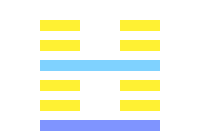
51.1.2.3.5.6 (51 > 44) - THE KĂN HEXAGRAM.
- 1. The first line, undivided, shows its subject, when the movement approaches, looking out and around with apprehension, and afterwards smiling and talking cheerfully. There will be good fortune.
- 2. The second line, divided, shows its subject, when the movement approaches, in a position of peril. He judges it better to let go the articles (in his possession), and to ascend a very lofty height. There is no occasion for him to pursue after (the things he has let go) ; in seven days he will find them.
- 3. The third line, divided, shows its subject distraught amid the startling movements going on. If those movements excite him to (right) action, there will be no mistake.
- 5. The fifth line, divided, shows its subject going and coming amidst the startling movements (of the time), and always in peril ; but perhaps he will not incur loss, and find business (which he can accomplish).
- 6. The topmost line, divided, shows its subject, amidst the startling movements (of the time), in breathless dismay and looking round him with trembling apprehension. If he take action, there will be evil. If, while the startling movements have not reached his own person and his neighbourhood, (he were to take precautions), there would be no error, though his relatives might (still) speak against him.
51.1.2.3.5.6 (51 > 44) - Shock
One is still allowed to compete because the judges have chosen to be reckless.
Bing DeepL Google Yandex51.1.2.3.5.6 (51 > 44) - Shock
One is still allowed to compete because the judges have chosen to be reckless.
Bing DeepL Google Yandex51.1.2.3.5.6 (51 > 44) - Kán, l’ébranlement
Kán : tonnerre, effroi répandu, crainte.
- 1. Le tonnerre approchant, on est plein d’effroi ; puis, quand il est passé, on sourit et on parle tous ensemble (on passe de la crainte à la joie).
- 2. Quand le tonnerre gronde, le danger arrive, on croit devoir tout abandonner et se retirer en un lieu sûr et élevé. Qu’on ne s’obstine pas à rechercher alors ce qu’on a abandonné ; on le retrouvera quelque temps après. (Quand le danger sera passé.)
- 3. Le tonnerre émeut, agite ; il pousse à agir justement.
- 5. Le tonnerre allant et venant répand l’effroi ; mais on doit tâcher de ne pas abandonner les affaires entreprises. Même dans le danger pressant, on doit garder le milieu.
-
6. Le tonnerre répand l’effroi et fait partout regarder avec trouble et crainte. S’il atteint et frappe, il causera un grand mal. (Ou : il corrige le mal.) Mais s’il ne frappe ni tel personnage, ni ses voisins, ce ne sera point un mal et fera seulement jaser les habitants d’une même maison.
Quand le tonnerre gronde, que l’orage éclate, le sage recherche la cause de ce fait (et tâche de profiter de l’avertissement céleste).
51.1.2.3.5.6 (51 > 44) - Le choc
On est quand même admis à concourir car les juges ont choisi d'être insouciants.
Bing DeepL Google Yandex51.1.2.3.5.6 (51 > 44) - Megrázkódtatás
- 1. Nevethet miután meglátja.
- 2. Ne keresse ami elveszett.
- 3. Meglátva a szakadást otthagyja őket.
- 5. Szilárdan áll a megrázkódtatás kezdetekor és végigkíséri a többieket míg véget nem ér.
- 6. Elvesztette a leggyengébbet, visszafogottnak kell maradnia míg nem változnak.
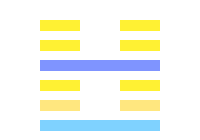
51.3.4.5.6 (51 > 37) - THE KĂN HEXAGRAM.
- 3. The third line, divided, shows its subject distraught amid the startling movements going on. If those movements excite him to (right) action, there will be no mistake.
- 4. The fourth line, undivided, shows its subject, amid the startling movements, supinely sinking (deeper) in the mud.
- 5. The fifth line, divided, shows its subject going and coming amidst the startling movements (of the time), and always in peril ; but perhaps he will not incur loss, and find business (which he can accomplish).
- 6. The topmost line, divided, shows its subject, amidst the startling movements (of the time), in breathless dismay and looking round him with trembling apprehension. If he take action, there will be evil. If, while the startling movements have not reached his own person and his neighbourhood, (he were to take precautions), there would be no error, though his relatives might (still) speak against him.
51.3.4.5.6 (51 > 37) - Shock
One fills out a form to obtain special rights.
Bing DeepL Google Yandex51.3.4.5.6 (51 > 37) - Shock
One fills out a form to obtain special rights.
Bing DeepL Google Yandex51.3.4.5.6 (51 > 37) - Kán, l’ébranlement
Kán : tonnerre, effroi répandu, crainte.
- 3. Le tonnerre émeut, agite ; il pousse à agir justement.
- 4. Le tonnerre approchant trouble et interdit [avant même l’éclair].
- 5. Le tonnerre allant et venant répand l’effroi ; mais on doit tâcher de ne pas abandonner les affaires entreprises. Même dans le danger pressant, on doit garder le milieu.
-
6. Le tonnerre répand l’effroi et fait partout regarder avec trouble et crainte. S’il atteint et frappe, il causera un grand mal. (Ou : il corrige le mal.) Mais s’il ne frappe ni tel personnage, ni ses voisins, ce ne sera point un mal et fera seulement jaser les habitants d’une même maison.
Quand le tonnerre gronde, que l’orage éclate, le sage recherche la cause de ce fait (et tâche de profiter de l’avertissement céleste).
51.3.4.5.6 (51 > 37) - Le choc
On remplit un formulaire pour obtenir des droits spéciaux.
Bing DeepL Google Yandex51.3.4.5.6 (51 > 37) - Megrázkódtatás
- 3. Meglátva a szakadást otthagyja őket.
- 4. Meg kell szabadítania magát a többiektől mielőtt tovább mehetne.
- 5. Szilárdan áll a megrázkódtatás kezdetekor és végigkíséri a többieket míg véget nem ér.
- 6. Elvesztette a leggyengébbet, visszafogottnak kell maradnia míg nem változnak.
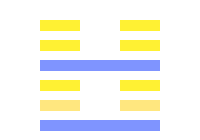
51.1.3.4.5.6 (51 > 53) - THE KĂN HEXAGRAM.
- 1. The first line, undivided, shows its subject, when the movement approaches, looking out and around with apprehension, and afterwards smiling and talking cheerfully. There will be good fortune.
- 3. The third line, divided, shows its subject distraught amid the startling movements going on. If those movements excite him to (right) action, there will be no mistake.
- 4. The fourth line, undivided, shows its subject, amid the startling movements, supinely sinking (deeper) in the mud.
- 5. The fifth line, divided, shows its subject going and coming amidst the startling movements (of the time), and always in peril ; but perhaps he will not incur loss, and find business (which he can accomplish).
- 6. The topmost line, divided, shows its subject, amidst the startling movements (of the time), in breathless dismay and looking round him with trembling apprehension. If he take action, there will be evil. If, while the startling movements have not reached his own person and his neighbourhood, (he were to take precautions), there would be no error, though his relatives might (still) speak against him.
51.1.3.4.5.6 (51 > 53) - Shock
One tells one's life to strangers because they don't know who they are dealing with.
Bing DeepL Google Yandex51.1.3.4.5.6 (51 > 53) - Shock
One tells one's life to strangers because they don't know who they are dealing with.
Bing DeepL Google Yandex51.1.3.4.5.6 (51 > 53) - Kán, l’ébranlement
Kán : tonnerre, effroi répandu, crainte.
- 1. Le tonnerre approchant, on est plein d’effroi ; puis, quand il est passé, on sourit et on parle tous ensemble (on passe de la crainte à la joie).
- 3. Le tonnerre émeut, agite ; il pousse à agir justement.
- 4. Le tonnerre approchant trouble et interdit [avant même l’éclair].
- 5. Le tonnerre allant et venant répand l’effroi ; mais on doit tâcher de ne pas abandonner les affaires entreprises. Même dans le danger pressant, on doit garder le milieu.
-
6. Le tonnerre répand l’effroi et fait partout regarder avec trouble et crainte. S’il atteint et frappe, il causera un grand mal. (Ou : il corrige le mal.) Mais s’il ne frappe ni tel personnage, ni ses voisins, ce ne sera point un mal et fera seulement jaser les habitants d’une même maison.
Quand le tonnerre gronde, que l’orage éclate, le sage recherche la cause de ce fait (et tâche de profiter de l’avertissement céleste).
51.1.3.4.5.6 (51 > 53) - Le choc
On raconte sa vie à des inconnus car ils ne savent pas à qui ils ont affaire.
Bing DeepL Google Yandex51.1.3.4.5.6 (51 > 53) - Megrázkódtatás
- 1. Nevethet miután meglátja.
- 3. Meglátva a szakadást otthagyja őket.
- 4. Meg kell szabadítania magát a többiektől mielőtt tovább mehetne.
- 5. Szilárdan áll a megrázkódtatás kezdetekor és végigkíséri a többieket míg véget nem ér.
- 6. Elvesztette a leggyengébbet, visszafogottnak kell maradnia míg nem változnak.
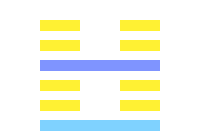
51.2.3.4.5.6 (51 > 9) - THE KĂN HEXAGRAM.
- 2. The second line, divided, shows its subject, when the movement approaches, in a position of peril. He judges it better to let go the articles (in his possession), and to ascend a very lofty height. There is no occasion for him to pursue after (the things he has let go) ; in seven days he will find them.
- 3. The third line, divided, shows its subject distraught amid the startling movements going on. If those movements excite him to (right) action, there will be no mistake.
- 4. The fourth line, undivided, shows its subject, amid the startling movements, supinely sinking (deeper) in the mud.
- 5. The fifth line, divided, shows its subject going and coming amidst the startling movements (of the time), and always in peril ; but perhaps he will not incur loss, and find business (which he can accomplish).
- 6. The topmost line, divided, shows its subject, amidst the startling movements (of the time), in breathless dismay and looking round him with trembling apprehension. If he take action, there will be evil. If, while the startling movements have not reached his own person and his neighbourhood, (he were to take precautions), there would be no error, though his relatives might (still) speak against him.
51.2.3.4.5.6 (51 > 9) - Shock
One shows one's friends what are the difficulties that others have hidden.
Bing DeepL Google Yandex51.2.3.4.5.6 (51 > 9) - Shock
One shows one's friends what are the difficulties that others have hidden.
Bing DeepL Google Yandex51.2.3.4.5.6 (51 > 9) - Kán, l’ébranlement
Kán : tonnerre, effroi répandu, crainte.
- 2. Quand le tonnerre gronde, le danger arrive, on croit devoir tout abandonner et se retirer en un lieu sûr et élevé. Qu’on ne s’obstine pas à rechercher alors ce qu’on a abandonné ; on le retrouvera quelque temps après. (Quand le danger sera passé.)
- 3. Le tonnerre émeut, agite ; il pousse à agir justement.
- 4. Le tonnerre approchant trouble et interdit [avant même l’éclair].
- 5. Le tonnerre allant et venant répand l’effroi ; mais on doit tâcher de ne pas abandonner les affaires entreprises. Même dans le danger pressant, on doit garder le milieu.
-
6. Le tonnerre répand l’effroi et fait partout regarder avec trouble et crainte. S’il atteint et frappe, il causera un grand mal. (Ou : il corrige le mal.) Mais s’il ne frappe ni tel personnage, ni ses voisins, ce ne sera point un mal et fera seulement jaser les habitants d’une même maison.
Quand le tonnerre gronde, que l’orage éclate, le sage recherche la cause de ce fait (et tâche de profiter de l’avertissement céleste).
51.2.3.4.5.6 (51 > 9) - Le choc
On montre à ses amis quelles sont les difficultés que les autres ont dissimulées.
Bing DeepL Google Yandex51.2.3.4.5.6 (51 > 9) - Megrázkódtatás
- 2. Ne keresse ami elveszett.
- 3. Meglátva a szakadást otthagyja őket.
- 4. Meg kell szabadítania magát a többiektől mielőtt tovább mehetne.
- 5. Szilárdan áll a megrázkódtatás kezdetekor és végigkíséri a többieket míg véget nem ér.
- 6. Elvesztette a leggyengébbet, visszafogottnak kell maradnia míg nem változnak.
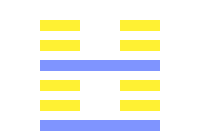
51.1.2.3.4.5.6 (51 > 57) - THE KĂN HEXAGRAM.
- 1. The first line, undivided, shows its subject, when the movement approaches, looking out and around with apprehension, and afterwards smiling and talking cheerfully. There will be good fortune.
- 2. The second line, divided, shows its subject, when the movement approaches, in a position of peril. He judges it better to let go the articles (in his possession), and to ascend a very lofty height. There is no occasion for him to pursue after (the things he has let go) ; in seven days he will find them.
- 3. The third line, divided, shows its subject distraught amid the startling movements going on. If those movements excite him to (right) action, there will be no mistake.
- 4. The fourth line, undivided, shows its subject, amid the startling movements, supinely sinking (deeper) in the mud.
- 5. The fifth line, divided, shows its subject going and coming amidst the startling movements (of the time), and always in peril ; but perhaps he will not incur loss, and find business (which he can accomplish).
- 6. The topmost line, divided, shows its subject, amidst the startling movements (of the time), in breathless dismay and looking round him with trembling apprehension. If he take action, there will be evil. If, while the startling movements have not reached his own person and his neighbourhood, (he were to take precautions), there would be no error, though his relatives might (still) speak against him.
51.1.2.3.4.5.6 (51 > 57) - Shock
One apologises profusely so as not to have to do more chores.
Bing DeepL Google Yandex51.1.2.3.4.5.6 (51 > 57) - Shock
One apologizes profusely so as not to have to do more chores.
Bing DeepL Google Yandex51.1.2.3.4.5.6 (51 > 57) - Kán, l’ébranlement
Kán : tonnerre, effroi répandu, crainte.
- 1. Le tonnerre approchant, on est plein d’effroi ; puis, quand il est passé, on sourit et on parle tous ensemble (on passe de la crainte à la joie).
- 2. Quand le tonnerre gronde, le danger arrive, on croit devoir tout abandonner et se retirer en un lieu sûr et élevé. Qu’on ne s’obstine pas à rechercher alors ce qu’on a abandonné ; on le retrouvera quelque temps après. (Quand le danger sera passé.)
- 3. Le tonnerre émeut, agite ; il pousse à agir justement.
- 4. Le tonnerre approchant trouble et interdit [avant même l’éclair].
- 5. Le tonnerre allant et venant répand l’effroi ; mais on doit tâcher de ne pas abandonner les affaires entreprises. Même dans le danger pressant, on doit garder le milieu.
-
6. Le tonnerre répand l’effroi et fait partout regarder avec trouble et crainte. S’il atteint et frappe, il causera un grand mal. (Ou : il corrige le mal.) Mais s’il ne frappe ni tel personnage, ni ses voisins, ce ne sera point un mal et fera seulement jaser les habitants d’une même maison.
Quand le tonnerre gronde, que l’orage éclate, le sage recherche la cause de ce fait (et tâche de profiter de l’avertissement céleste).
51.1.2.3.4.5.6 (51 > 57) - Le choc
On se répand en excuses pour ne pas avoir à faire davantage de corvées.
Bing DeepL Google Yandex51.1.2.3.4.5.6 (51 > 57) - Megrázkódtatás
- 1. Nevethet miután meglátja.
- 2. Ne keresse ami elveszett.
- 3. Meglátva a szakadást otthagyja őket.
- 4. Meg kell szabadítania magát a többiektől mielőtt tovább mehetne.
- 5. Szilárdan áll a megrázkódtatás kezdetekor és végigkíséri a többieket míg véget nem ér.
- 6. Elvesztette a leggyengébbet, visszafogottnak kell maradnia míg nem változnak.

